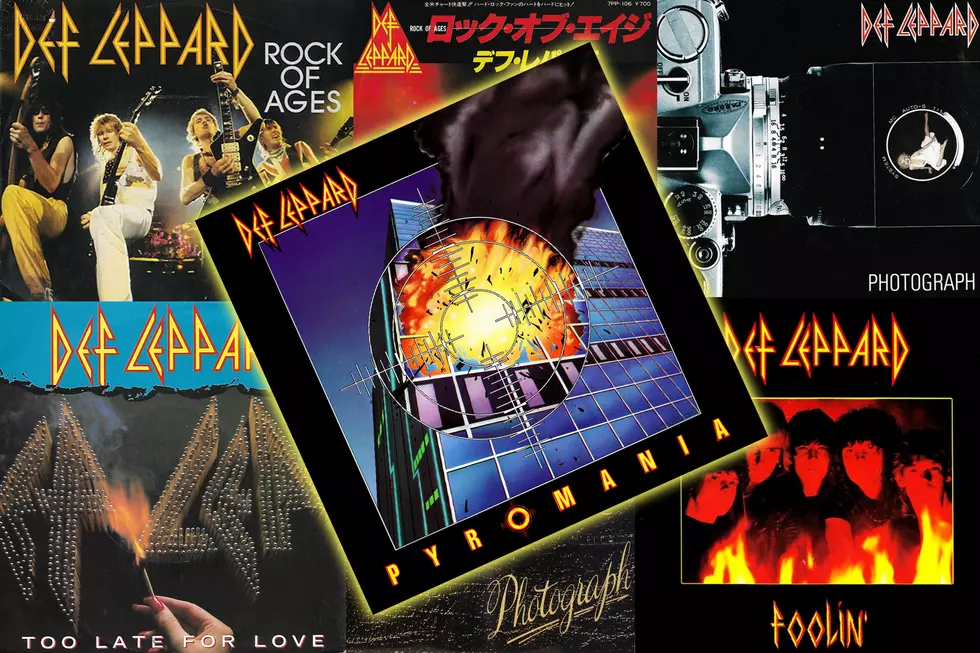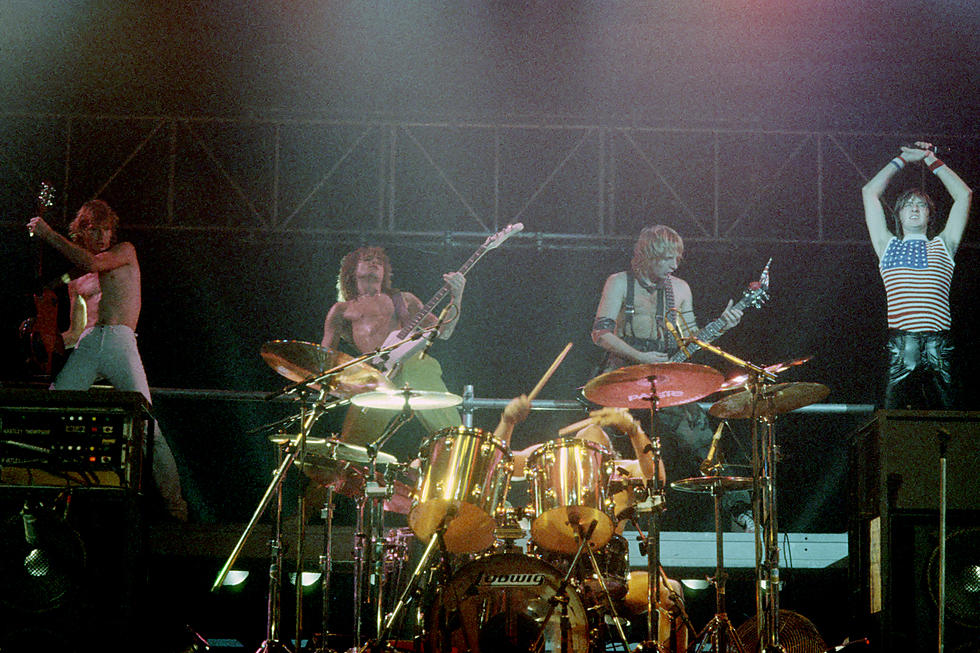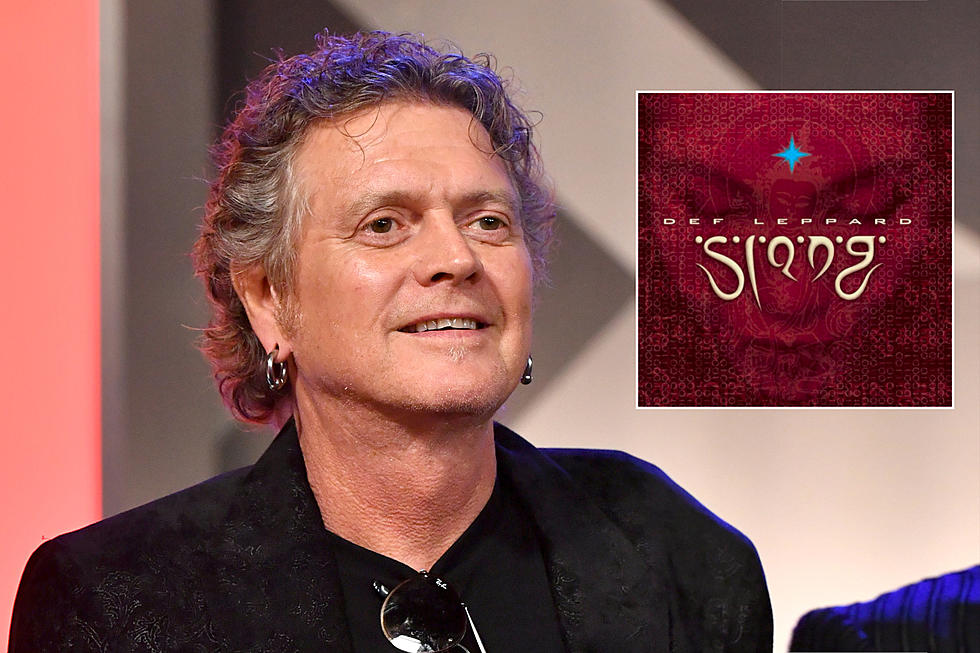
Def Leppard’s Phil Collen on Manraze Project: ‘There’s No Restrictions and It’s Wonderful’
Def Leppard guitarist Phil Collen sat down with Ultimate Classic Rock more than two years ago to talk about ‘punkfunkrootsrock,’ the current album by his side project Manraze. As its title indicates, the album's diverse collection drew together a little bit of everything that the group members were listening to. From reggae-influenced bits to Hendrix-like jams, ‘punkfunkrootsrock’ shouldn’t have hung together as well as it did, but thematically there's no doubt that the material bound together as a truly rewarding album experience.
Since then, Collen has kept busy with Def Leppard, including a series of Las Vegas dates celebrating the band’s classic ‘Hysteria’ album. But Manraze are never too far away in his rear-view mirror, as we learned in a recent interview.
Collen and his Manraze bandmate Simon Laffy (who spent together back in the day in the glam-metal band Girl) talked about the group's new EP, which features ‘I Surrender’ -- a song that's been sitting in the band’s archives for eight years waiting to be completed. The EP is rounded out by a new acoustic version of ‘All I Wanna Do,’ originally found on the ‘punkfunkrootsrock’ album, plus a live track.
What’s the story with this new EP? It’s a good sampler grab-bag kind of thing, because you’ve got some new material, some acoustic material and a live track. It’s definitely a good intro piece for somebody who hasn’t heard this band.
Collen: Definitely. The song is actually eight years old. Simon came up with the idea originally and we called it ‘Too Cruel’ and we go, “Wow, this song’s great, but the chorus sucks” and we didn’t know what it meant. This happens a lot with songwriting -- you come up with an idea and it can be a vague lyric and you make it work. But this motherf---er didn’t change for eight years, and then I was sitting in the swimming pool on tour with Def Leppard and just started singing this chorus and I thought, “Oh my God!” I got back and I said to Simon, “Hey, have you got the drum track that Paul [Cook] originally played?” We’d recorded it at a demo studio, so he sent me that and I played some guitars over it and a guide vocal and sent it to Simon, he put some bass on it, sent it back to me and we just kind of did it like that. Ger McDonnell mixed it and did an amazing job, and he took it somewhere that we wouldn’t have as well. It was a lovely success story as far as writing a song, producing it and still having something after eight years. So it was very special.
Laffy: To reinforce what Phil said, I think ideas have to have some sort of merit in order to exist. It may not be a complete idea, but it had to have something that kept it in our consciousness. We just loved the atmosphere and the vibe of it and the rhythmic essence of it, which was something that Paul injected into it at an early stage. It had beautiful chords and progressions, but we just didn’t have the concrete theme, lyrically, and that’s really where Phil’s eureka moment, in the swimming pool appropriately, happened.
Collen: That’s the great thing about being an artist or a songwriter: If you have a good idea, it’s still good and there’s something about it [that will reveal itself eventually]. [With Def Leppard,] the song ‘Animal’ took three years to do. Obviously, we weren’t working on it the whole time. But there was something that wasn’t quite right with the original thing. Joe [Elliott] had done vocals on it and we loved it, and [producer] Mutt [Lange] said, “Let’s change the whole backing track,” so this was a little bit like that. The essence of it was magical, but we knew that it could be really special and we felt that. Even the message behind it, it’s about confronting yourself and denial. It can mean a lot of different things, but that’s the vantage point and really what it’s about. It was amazing, so I’m really glad we kind of held out and made it special because it deserves that.
With this band, it seems like things move kind of fast and that you guys have a lot of really good energy and inspiration going on with this project. So I’m not surprised to hear that you have stuff like that hanging around. Is there a lot of material like that which has been sitting in process that you’ve been trying to figure out what to do with it?
Collen: Well, we do, but I think what tends to happen normally is that we just tend to get a spark of an idea and that sets us off. Me and Simon usually have a concept for it, it’s almost like a story. We’ll talk about what the song is about -- it’s almost like writing a script or something. It’s actually really cool -- it’s a wonderful creative process. That’s why you’re a musician is to create and express yourself. So this is the actual high of that and that’s why we love it so much. I think we just bounce ideas back and forth and before you know it, it will take on something else. Like the acoustic [track] that’s on there ['All I Wanna Do'] -- it sounds like a ‘70s soul version of one of our other songs, so we went with that. Debbi Blackwell-Cook, who I’ve been singing with for a while and she sang on ‘Take on the World’ and also sings at the end of ‘I Surrender,’ she was singing on that with me as well and Simon does some upright bass on it, and it’s just stuff that you’ve always wanted to do but never got the chance to do. We really relish that and love that in Manraze, the fact that you’ve got an upright bass and a soul singer on there, it’s like, “Wow, this is so cool!” It’s like whatever you want to do, there’s no restrictions and it’s just a wonderful feeling, the whole thing.
That’s one of the things that I love about this band. You can just hear that it’s about the music and there’s no agenda behind that.
Laffy: I think what underlines a lot of it is our camaraderie and that particularly Phil and I are very long-term old friends, so we have this immense empathy and trust in each other and Paul is included in that. We are all extremely respectful of each other in terms of creativity and very supportive and nurturing. So we get that environment where we bounce ideas quickly and we enjoy it. Phil and I, we just laugh and have fun and it’s such a really enjoyable process. I think we’ve all felt that throughout the history of Manraze. We’re like a brotherhood in a way, we’re brothers and we really feed off each other in terms of family, relationships and we love doing it. I think if we didn’t love doing it, we wouldn’t still be doing it now.
You and Simon go way back -- I’d imagine that you’re both different players now compared to where you started out.
Collen: Very much so. Interestingly enough, we’d be listening to some of the stuff that we infused in the stuff now that we wouldn’t really have done in Girl or Def Leppard. We’d listen to Stanley Clarke or a George Duke album, me and Simon especially, but you would never be able to get that out in the bands that we were in because it just wouldn’t work. Not to say that we didn’t like the band that we were in, but there’s a time and a place for everything and using your influences. What’s weird about Manraze is that you can use them all. I mean, we love the Police, we love some of the energy of all of the punk stuff, we love all of the ‘70s funk and soul, and we actually infuse all of that into the stuff and you can actually hear it. It’s kind of unique in that way -- it’s kind of the dream band if you like, as far as that goes.
Laffy: I remember in the Girl days being on tour in Japan and hanging out backstage and at the hotel and listening to Weather Report and things like that, really stuff you would never in a million years connect with a glam-rock band. We’ve always loved really old classic reggae, which goes back into the ‘60s and whatever else. I think we just don’t put any limitations on ourselves. We allow ourselves to fly and hopefully that reflects in what comes out and what is produced. It may seem a little bit erratic possibly to some people. I think some people don’t quite understand what we’re doing. You know, what’s that reggae track about? For us, it’s just free expression -- it’s us and it all comes from within us so it seems to be intact and it seems to have an integrity to us anyway.
I think that’s a real good endorsement of the quality of the music, how well all of those different styles hang together as an album. All of the stuff that you guys were doing on that last record, on paper it shouldn’t work but it totally does.
Collen: Right. What’s interesting is that it usually doesn’t work because people will say, “Well, you can’t do that.” I think one of the beauties about the industry right now is that you’re seeing a lot of young kids coming up without an A&R guy or a label saying, “You can’t do that.” So that’s really cool. We kind of do that, although we’re not a bunch of kids, we still have that freedom. I do believe that the industry allows it these days if you want it to. Some people are just stuck in their boxes and I think that the wonderful thing about it with us is that people don’t actually have to be.
Laffy: Somebody said a wonderful thing to us recently, he said, “People put their iPods on shuffle and in a way they don’t want to hear an album that’s the same track after track” and not in a deliberate way, the Manraze album is a little bit like that. It does tend to jump from one theme to another. There’s a little bit of funk, there’s a little bit of soul and there’s a little bit of dub in there, so we are kind of shuffling around a bit.
Collen: That was actually at the Grammys -- we were at the Grammy offices and that’s what they said there, which we thought was a huge compliment and they actually gave it as a huge compliment. It was actually really nice -- it was like, “Wow, that’s great!” Because absolutely, you’ll be listening to Marvin Gaye one minute and it’s the Foo Fighters the next.
It’s got to be a little bit gratifying that people actually seem to be getting what this band is about. Because with what you’ve done with Def Leppard, I could see you having concerns that you might put this out there and people would just want it to sound like Def Leppard and reject it because maybe it doesn’t fit that mold for them.
Collen: I think certainly with this song more than all the others, it has a bit of a crossover appeal. Everyone that we’ve spoken to so far, some of the really hardcore Def Leppard fans really like this because it reminds them [of that], because you know, it’s the same guitar player and the guy who does that backing vocals. So you hear that sometimes. A lot of the time in Manraze, we kind of try and steer away from it. With this one, we just let it do its thing and I think that was a nice thing to do. It’s great not having any hard, fast rules that you live by. I think it’s nice to change it up now and then and do something different. With this song, it kind of had a little bit of a flair to it, almost like a Def Leppard-y type guitar part, which that’s obviously going to happen occasionally, so we just let it go its way and it’s kind of nice to do that.
Laffy: But one of our rules if we had any was to not be obvious. We felt like it would have been obvious to do cover songs of the [Sex] Pistols or Def Leppard or even Girl. So I guess maybe in a way, subconsciously, maybe that’s why this track has been held back because there is that little bit of Def Leppard resonance in it.
The last album got good reception. Does this song indicate that you might be working on another album?
Collen: Yes! We just got very excited about this [track]. You know, I just had this operation in Paris, but we’re all coming back to London and then we’re setting up little home studio and we’ve got a lot of the demos and some of the stuff that ended up on the album at Simon’s old house, his mum’s place, in the spare room. It was just a nice place [to work]. I have a place in London and we have a base for recording, so it’s really cool to do that. I don’t mean like a full blown drum kit -- it’s just like a computerized kind of suite that you can do vocals, guitars and drum programming. It’s literally walking distance from where we live and everything. So that’s really exciting. We actually found an old cassette -- Simon had this old cassette and before it was going to be called Manraze, we threw these ideas around - The Fay Wrays was one of the names was one of the name that we thought of. There’s a demo [from that time period] of acoustic guitar or something, of us goofing around and the first thing that comes up is this great idea that it never came to fruition, so I think we’ll revisit some of these things.
More From Ultimate Classic Rock









